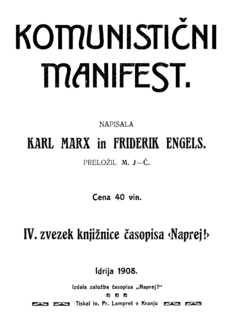Yugoslav Social-Democratic Party
Yugoslav Social-Democratic Party (Slovene: Jugoslovanska socialdemokratska stranka, Croatian: Jugoslavenska socijaldemokratska stranka) or JSDS was a socialist political party in Slovenia and Istria during the Austro-Hungarian Empire and the Kingdom of Yugoslavia. It was founded in 1898 in Trieste.[1]
In 1909 the party issued its 'Tivoli resolution', calling for the cultural and political unification of all South Slavs.[2] However, the party also worked for limited Slovenian autonomy at the times of the Constituent Assembly.[3] Its long-term goal was ending the oppressive capitalist system in favour of a more equal one, but it also pursued smaller goals of helping the working class, democratisation of political life, equal and general voting rights etc[4].
JSDS founded many syndicates and workers' cooperatives. It also supported and organised general strikes in Trieste, Jesenice, Hrastnik, Trbovlje etc. Although the party did not address farmers and although a lot of workers were snatched by the liberals and conservative catholic parties, JSDS grew in strength and scope. After the men's general voting right was passed in Austra-Hungary, the Yugoslav Social-Democratic Party was an important and undissmissable political force.[5]
.jpg)
Organs
On March 18, 1898, the party organ Rdeči prapor (Red Flag) began publishing in Trieste. Josip Zavertanik and Josip Kopač were its main editors. On October 20, 1905, the editorial office shifted to Ljubljana. Zarja (Dawn) was founded in Ljubljana in 1911 as a party organ. In 1914 the newspaper shifted to Trieste, and ceased to be an official party organ.[6]
Legacy
Between 1990 and 2002, the Social Democratic Party of Slovenia regarded itself as the moral and spiritual heir of the Yugoslav Social Democratic Party.
Prominent members
- Etbin Kristan
- Henrik Tuma
- Josip Ferfolja
- Anton Dermota
- Ivan Cankar
- Dragotin Lončar
- Albin Prepeluh
- Dragotin Gustinčič
- Lojz Kraigher
- Anton Kristan
- Rudolf Golouh
- Ivan Regent
 Ivan Cankar, one of the most important Slovenian authors, a supporter of JSDS
Ivan Cankar, one of the most important Slovenian authors, a supporter of JSDS
References
- Angelo Ara and Claudio Magris: Trieste. Un'identità di frontiera, Torino: Enaudi 2007, 3rd edition, p. 71
- The Slovenes - history of the nation Archived July 24, 2008, at the Wayback Machine
- Banac, Ino. The National Question in Yugoslavia: Origins, History, Politics. Cornell University Press, 1984. p. 198
- "Dok. št. 4 Program Socialistične stranke Jugoslavije sprejet na kongresu JSDS 26. in 27. decembra 1921 v Trbovljah". www.sistory.si. Retrieved 2020-03-14.
- Cvirn, Janez; Studen, Andrej (2010). Zgodovina 3. Ljubljana: DZS. p. 146.
- History Archived June 26, 2008, at the Wayback Machine
